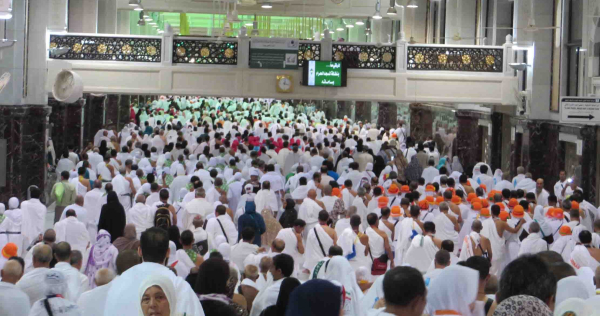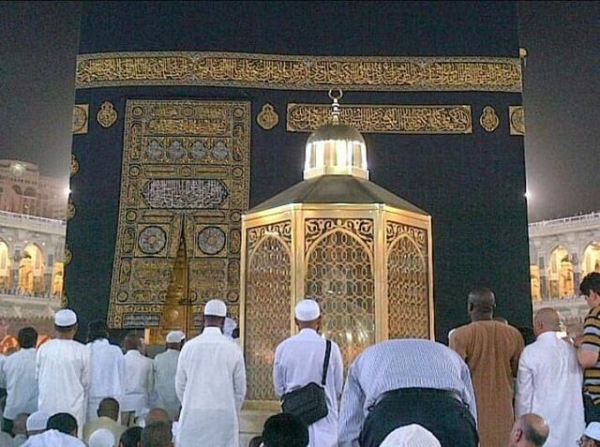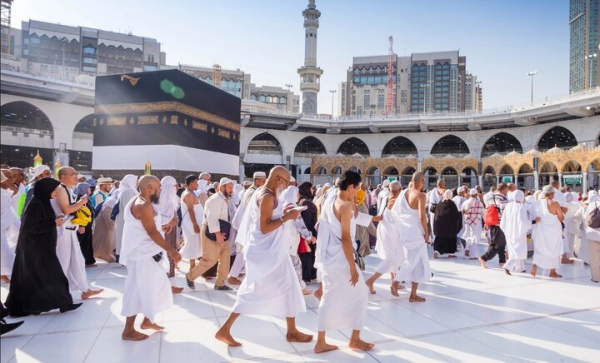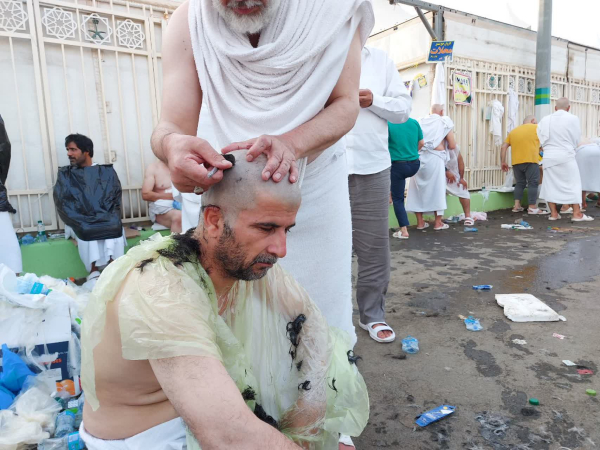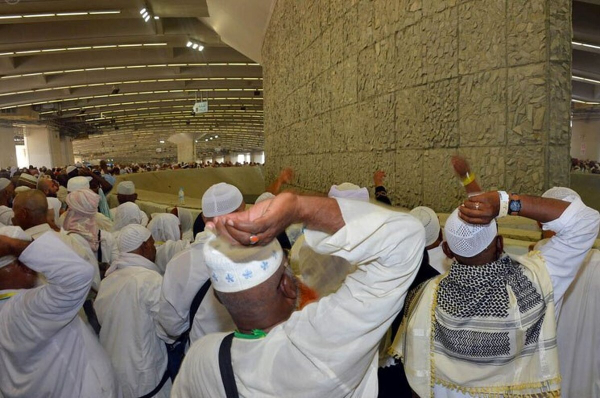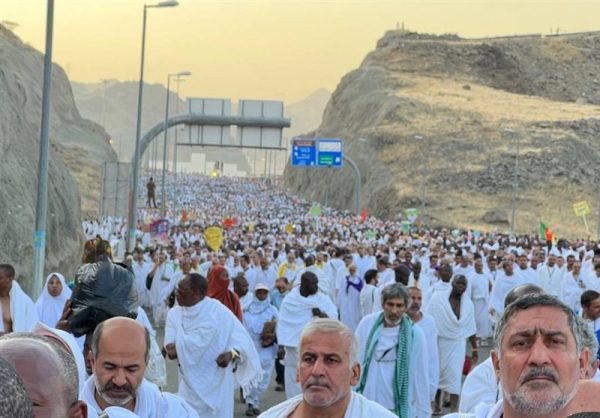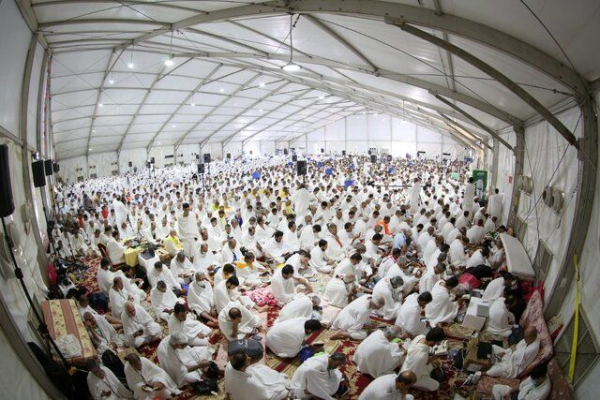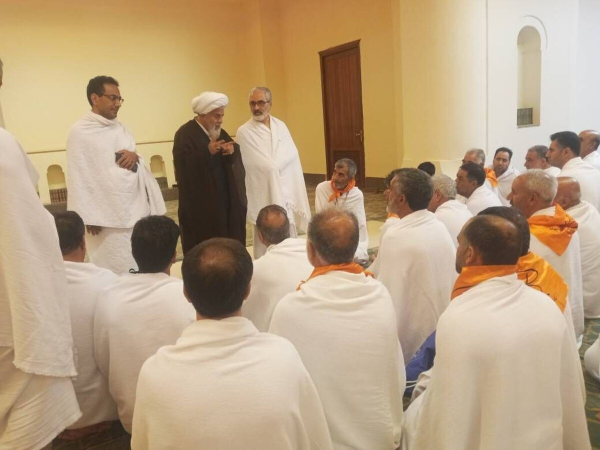zarezadeh
Sa'i between Safa and Marwah
The third act of Mecca is Sa'i between Safa and Marwah, which must be performed seven times. This is no different from Sa'i between Safa and Marwah, which was mentioned in the acts of Umrah, except for the intention, which is to perform the Sa'i between Safa and Marwah for Hajj. This act is modeled after Hazrat Hajar, peace be upon her.
Tawaf prayer for Hajj
The second of the acts of Mecca is the Tawaf prayer. This prayer is no different from the Tawaf prayer for Umrah, and its rules and etiquette are the same, except that here one must make the intention for the Tawaf prayer for Hajj.
After the Tawaf of Ziarat, this prayer should be recited immediately. This prayer is recited behind the Maqam of Hazrat Ibrahim.
Tawaf-e-Ziyarat
It is obligatory to return to Mecca after completing the three acts of worship in Mina, to perform the acts that are obligatory there. However, it is not necessary to return to Mecca on the same day of Eid or the day after to perform the acts of worship in Mecca. Rather, one can delay these acts until the end of Dhul-Hijjah. This means that if the last day of Dhul-Hijjah comes and he performs the acts, there is no problem. However, since it is obligatory to stay in Mina on the eleventh and twelfth nights, and it is also obligatory to throw stones at the Jamarat in Mina on these two days, they usually stay in Mina for these two nights and two days, and then return to Mecca after the afternoon of the twelfth day and perform the acts for the few days they are in Mecca.
Issue: The first act that must be performed in Mecca after returning from Mina is the Tawaf-e-Hijjah, which is called Tawaf-e-Ziyarat. This Tawaf is the same as the Tawaf-e-Umrah in all its customs, conditions, and rulings. As mentioned, the only difference is in the intention, which here must be with the intention of the Tawaf-e-Hijjah.
Cutting hair and nails or shaving the head
After slaughtering, it is obligatory to shave the head or to cut some of the hair or nails. Of course, if it is the first year of Hajj, it is obligatory to shave the head, but for a woman, shaving the head is not permissible and she must make a mistake, that is, either by the hair or by the nails; and shaving the head or cutting the head is an act of worship, and it must be with the intention of approaching and not showing off, which will be invalid, and shaving the beard does not suffice to make a mistake.
Issue: It is permissible to shave the head herself or to have someone else do it, and the same applies to making a mistake, but she must make the intention herself, and it is better for someone else to make the intention as well.
Issue: The place for shaving the head or cutting the head is Mina, and it is not permissible to do it anywhere else, but it is not obligatory. Rather, it is permissible to delay it until the end of the thirteenth day, although it is recommended to do it on the day of Eid as a precaution.
Issue: If someone intentionally, unintentionally, or out of forgetfulness and ignorance of the issue does not shave or shave until he leaves Mina, it is obligatory for him to return to Mina and do so. If returning is not possible, he should shave or shave wherever he is and, if possible, send his hair to Mina.
Issue: It is necessary to observe the order of these three acts as a precaution and obligatory; that is, first throwing the Jamarat, then the sacrifice, then shaving or shaving; but if he does not observe the order unknowingly, there is no problem and it is correct.
Issue: After shaving or shaving, a person leaves Ihram and the things that were forbidden to him become permissible except for three things: women, pleasant odors, and hunting in the sanctuary.
Sacrifice and its rulings in Hajj
After stoning the Jamarat on the day of Eid, it is obligatory to sacrifice a camel, cow, or sheep in Mina. Since sheep are usually sacrificed, it should be known that the sheep to be sacrificed must be, as a matter of precaution and obligation, one year old and in its second year. It must be healthy and flawless in every way, meaning that it must not have any defects in its horns, tail, testicles, ears, eyes, hands, feet, etc. It must also not be thin, and as a matter of precaution, it must not be lame. However, if its ear is split or has a hole, but is not defective or cut, there is no problem. Likewise, if its outer horn, which is like a sheath for the inner white horn, is broken, and the inner horn itself is healthy, there is no problem.
Issue: A person can slaughter the animal himself or he can hire a representative, and the representative must be a Shia and make the intention at the time of slaughter for everyone who is slaughtering, and it is known that in the slaughter of expiation, it is also necessary for the slaughterer to be a Shia.
Issue: It is not correct to participate in the sacrifice and everyone must sacrifice a sacrifice himself.
Issue: If one intentionally or due to an excuse does not sacrifice on the day of Eid, the obligatory precaution is to slaughter it during the days of Tashreeq, i.e. the eleventh, twelfth and thirteenth, and if that is not possible, during the rest of the month of Dhul-Hijjah.
Issue: The recommended precaution is to divide the sacrifice into three parts: one part should be given as a gift, one part as charity, and some of it should be eaten and the charity should be given to the believers. However, since none of these are obligatory, there is no problem if one gives the charity to the poor infidels or if one gives the entire sacrifice to them. And it does not guarantee the share of the poor. Of course, caution is very desirable, especially in eating a certain amount of the sacrificed animal, but it is not obligatory.
Issue: If someone delegates to someone to buy and slaughter a sacrifice for him, and the delegate also does so, and then the person doubts whether he did it correctly or not, it is sufficient and correct to ignore this doubt.
Issue: If someone does not have the power to sacrifice, meaning that he does not have a sheep, nor the money to buy it, nor can he borrow or obtain it in any other way, instead of sacrificing, he must fast for three days during Hajj and seven days after returning from Hajj. (There are some issues here that we have not mentioned because they do not usually happen. If this happens, ask his family.)
Going to Mina and throwing pebbles (throwing pebbles at Jamarat al-Aqaba)
A person who performs Hajj must go from Mashar al-Haram on the day of Eid to a place called Mina, and one of his actions there is throwing pebbles at Jamarat al-Aqaba, meaning he must throw seven pebbles at the last Jamarat.
Issue: The pebbles must be medium-sized, not like fine sand or large stones, and they must also be made of stone, meaning that clay, pottery, and jewelry are not valid, but any type of stone, even marble, is fine.
Issue: The pebbles must be from the Haram (the Haram is a specific area of the city of Mecca and its surroundings). Of course, they should not be from Masjid al-Haram or Masjid al-Khayf, but as a precaution, they should be from other mosques, and it is recommended to take them from Mashar, and they must be virgin, meaning that no one else has thrown them in the past years.
Issue: It is obligatory to throw pebbles with the intention of approaching the Jamarat, not to place them on the Jamarat; and it is obligatory to throw seven pebbles with certainty, and if he doubts whether he has thrown seven pebbles or not, he should throw until he is certain that he has thrown seven pebbles.
Issue: Purity is not a condition in throwing the Jamarat, therefore a person who is junub, menstruating, or whose body or clothes are impure can throw them, and it is correct. Even if the pebbles themselves are impure, there is no problem, but they must be permissible, meaning that he should not take possession of pebbles that others have taken without their permission.
Issue: The time for throwing pebbles is from sunrise on the day of Eid until sunset, and if he forgets, he can do it until the thirteenth day. If he does not remember until the thirteenth, the precaution is that he throws them himself or his deputy the following year.
Issue: A child or a sick person who is unable to perform the ritual ablution should have someone else perform it on their behalf. Those who are unable to perform the ritual ablution and have an excuse not to perform the ritual ablution during the day can perform it at night, whenever it is nighttime.
Staying in Mash'ar al-Haram
The obligatory precaution is to spend the tenth night in Mash'ar al-Haram until the call to prayer for Fajr, intending to draw near to Allah, and when it is morning, intend to stay in Mash'ar al-Haram until sunrise for drawing near to Allah. This stay from dawn until the first sunrise is an optional stay in Mash'ar and is obligatory, but not all of it is a rukn, but rather a rukn to the extent that it can be said that he stayed in Mash'ar between the two departures, even if it is one minute. If someone intentionally and knowingly leaves out the rukn, his Hajj is invalid.
Issue: A person who does not reach the rukn due to an excuse must reach one of the two obligatory stays in Mash'ar, i.e. either he reaches some part of the night until the call to prayer for Fajr, or he stays in Mash'ar for some part of the night until the call to prayer for Fajr, or he stays in Mash'ar for some part of the day from sunrise until noon, even if it is one minute. In short, if someone does not reach the optional stay in Arafat or Mash'ar, he must understand the emergency stay, and we know that the emergency stay in Arafat is part of the night of Eid, and in Mash'ar there are two emergency stays, one on the night of Eid until the morning call to prayer, and the second from sunrise on the day of Eid until noon; and here are many cases that are described in detailed books with their rulings, and since it is very long, it has been avoided to mention it. If this happens to someone, he must immediately contact his family and understand his duty and act so that his Hajj is not invalidat
Staying in the Land of Arafat
As an obligatory precaution, it is necessary to be in the Land of Arafat from the sunset of the ninth day until sunset, and what is meant by “staying” is staying there. Now, whether he sits, walks, or sleeps does not matter. Of course, if he is asleep or unconscious during this entire period, his stay is invalid. Therefore, it is necessary to delay from the beginning of Zuhr. If it is short, for example, the length of Zuhr and Asr prayers that he prays one after the other, it is not known whether it is forbidden.
Issue: Although staying in the entire period from Zuhr to Maghrib is obligatory, it is not the entire Rukn that invalidates the Hajj by leaving it. So if he stops for a short period and leaves, or comes towards Asr and stops, his Hajj is valid, even if his failure to stop for the entire time was deliberate and intentional. What is included in the stay in the Rukn is the amount of time that it is said that he was in Arafat, even if it is for a minute or two. So if he does not go to Arafat at all, he has left the Rukn.
Issue: If he knowingly and intentionally leaves out the amount of standing that is a pillar, his Hajj is invalid and it is not sufficient for such a person to stand on the night of Eid, which is an emergency standing. However, if due to an excuse such as forgetfulness, he could not stand even the amount of standing in Arafat, it is sufficient for such a person who has an excuse to stand on the night of Eid, even if it is a small amount, and this is called an emergency standing, and the first is voluntary standing. And if he leaves out this amount of standing on the night intentionally, his Hajj is invalid. However, if he leaves this also due to an excuse, forgetfulness, or negligence and ends up with a voluntary standing, his Hajj is valid.
Issue: If someone intentionally and knowingly leaves Arafat for Hajj before sunset and does not return until sunset, he must sacrifice a camel in the way of God, wherever he wants. If he does not have the power to sacrifice, he must fast for eighteen days and his Hajj will be valid. If he does this out of ignorance or by mistake, there is no expiation, and in any case, it will not harm the essence of Hajj.
Where should one enter the state of ihram for Hajj Tamattu?
The state of ihram for Hajj is valid anywhere in the city of Mecca, even if it is in newly built houses that are part of the city. However, it is recommended to enter the state of ihram at Maqam Ibrahim or Hijr Ismail.
Can Satan tempt in the form of a human?
Ibn Abbas says: Satan came in the form of Suraqah ibn Malik to encourage the infidels of Quraysh to fight the Muslims and told them that he would support them and that no one would be able to defeat them! This incident is reported in the margin of the following verse:
«و اذ زَینَ لَهُمُ الشَّیطنُ اعملَهُم وقالَ لا غالِبَ لَکمُ الیومَ مِنَ النّاسِ وانّى جارٌ لَکم...».[انفال 48]
[Ibn Shahrashob Mazandarani, Muhammad ibn Ali, Mutashabih al-Quran wa al-Musafah, Introduction, Shahristan, Vol. 1, p. 21, Qom, Bidar, first edition, 1410 AH]
رفاعه انصارى میگوید: وقتی ابلیس دید فرشتهها با بتپرستان در روز بدر چه کردند، ترسید که او را نیز بکشند. حارث بن هشام به گمان اینکه او سراقة بن مالک است، به او نزدیک شد؛ اما شیطان مشتى به سینه حارث زد و او را انداخت و فرار کرد و خود را به دریا افکند و گفت: بار خدایا من از تو میخواهم که مهلتی به من بدهی![ مجلسی، محمد باقر، بحار الانوار، ج 60، ص 282، بیروت، مؤسسة الطبع و النشر، چاپ اول، 1410ق. ]
عبدالرحمن بن حنیش گفت: لشگر شیاطین برای کشتن پیامبر(ص) آمدند و پیامبر(ص) با دیدن آنها نگران شد، اما جبرئیل نزد حضرتشان آمد و عرضه داشت که برای نجات خود این جملات را بگویید:
Rifa'ah al-Ansari says: When Iblis saw what the angels did to the idolaters on the day of Badr, he was afraid that they would kill him too. Al-Harith ibn Hisham approached him, thinking that he was Suraqah ibn Malik; but the devil struck Al-Harith's chest with his fist and threw him down, and he fled and threw himself into the sea, saying: O God, I ask You to give me some respite! [Majlisi, Muhammad Baqir, Bihar al-Anwar, vol. 60, p. 282, Beirut, Mas'at al-Tab' wa al-Nashr, first edition, 1410 AH.]
Abd al-Rahman ibn Hanish said: The army of devils came to kill the Prophet (PBUH), and the Prophet (PBUH) became worried when he saw them, but Gabriel came to his Prophet and suggested that he say these words to save himself:
«أَعُوذُ بِکلِمَاتِ اللَّهِ التَّامَّاتِ اللَّاتِی لَا یجَاوِزُهُنَ بَرٌّ وَ لَا فَاجِرٌ مِنْ شَرِّ مَا خَلَقَ وَ بَرَأَ وَ ذَرَأَ... ».
We have many such narrations, each of which requires a more detailed examination of its evidence and content, but the important thing is that Satan always tries to pursue his goals with internal temptation and with the help of evil-minded people, in other words, with demons of jinn and humans, and - except in a few cases - he does not see the need to materialize and embody, in which case he cannot be recognized. So the solution is that a person should try not to give in to the obsessions and evil words, and what difference does it make how these words and temptations were transmitted to him. In other words, knowing that the other party is Satan himself or a person with evil-mindedness has no effect on the outcome, and accordingly, one should not be deceived in either case.
